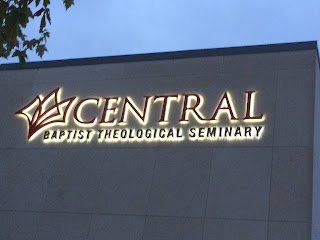My LinkedIn account reminded me recently that I have been associated with Central Seminary in Shawnee, Kansas, for fifteen years this month. It has been an interesting journey that has taken me to unexpected places.
Association with Central Seminary began while I was Coordinator of Tennessee Cooperative Baptist Fellowship. The seminary offered an “alumni by choice” certificate to invite those who had attended other seminaries to show their support and I readily signed on.
My more official relationship with seminary began in 2005 when I became the volunteer site coordinator for Central’s teaching church site at First Baptist Church in Murfreesboro. We provided the opportunity for students who were already immersed in ministry, work, and family life to pursue the Master of Divinity degree without uprooting their lives and relocating to pursue a seminary degree.
During the Tennessee Site years, I was invited to become an adjunct instructor and teach courses in Christian Witness, Formation for Ministry, and Missional Praxis. This opened a path to teach several online courses in coaching and the chance to help over 30 students develop their coaching skills.
When I was invited to teach “Mentoring, Coaching, and Learning Communities” in the Doctor of Ministry program on the main campus, I readily degree. This eventually led to an 18-month tenure as Interim Director of the Doctor of Ministry program that involved designing a new curriculum and relaunching the program.
I continue to teach an online course on “Missional Imagination” and pinch-hit when there is a special need. The faculty graciously gave me academic standing as Supplemental Associate Professor of Missional Theology and the Board of Trustees honored me with the Distinguished Service Award two years ago.
My primary assignment with the seminary right now is with the seminary’s “ReShaping Church: A Thriving Congregations Initiative” funded by the Lilly Endowment. The project is led by Dr. Angela Barker Jackson, the seminary’s Grant Officer. I represent the service provider, Pinnacle Leadership Associates, as Project Manager.
During the last 15 years, I have observed several things about Central Seminary.
First, strong leadership and a “deep bench” of faculty, staff, and administrators. These are creative, committed people who are never reckless but are willing to take risks when necessary.
Second, a significant commitment to innovation. Creativity is coming up with a good idea, innovation is putting it into practice. Innovation is hard work, but it pays off. For example, Central was already offering a complete online curriculum when other institutions were forced to make that pivot this year due to COVID-19.
Third, a committed and diverse student body. When we started the center in Tennessee, we want to be inclusive, diverse, and egalitarian. Central embodies all of those characteristics with a student body that includes women and men preparing for ministry, different Christian traditions, ethnic diversity, global representation, and radical inclusion.
All of these attributes will be needed in the days ahead in a continually evolving and challenging time for theological education. I look forward to my association with Central Seminary and celebrate the call of Dr. Pamela Durso as the new President of the institution. She will provide the leadership that will help the seminary thrive on the new leg of the journey. It is good to be one of her traveling companions.
If you would like to provide financial support for Central Seminary, please use this link.

Comments